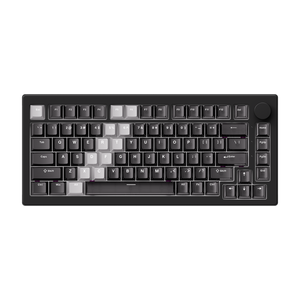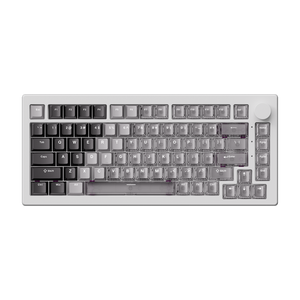With wireless technology now faster than ever, the question arises: Is it time to cut the cord—or does the wired mouse still have the edge? This guide compares wired and wireless mice to help you choose the best option.
What is a wired mouse?
A wired mouse connects directly to the computer via a cable, usually a USB port. It transmits movements and clicks without delay, without batteries, and without a wireless connection.
Advantages of a wired mouse:
Stable connection: No radio interference or connection drops – reliable and uninterrupted use.
Low latency: The physical connection ensures particularly fast response times – a must for e-sports athletes, graphic designers, or anyone who needs precision.
No battery required: Always ready to use, no need to charge or change batteries – ideal for longer or intensive use.
Price-performance ratio: Cheaper than wireless models with comparable performance.
Disadvantages of a wired mouse:
Restricted movement: The cable can restrict freedom of movement.
Cable clutter: A messy desk, broken cables, or tangled cables can be disruptive or shorten the lifespan.
Less mobile: Not really suitable for use on the go as the cable is unwieldy.

What is a wireless mouse?
A wireless mouse is an input device that communicates with your computer via Bluetooth or a 2.4 GHz wireless connection. It works without cables, offering greater flexibility and freedom of movement.
Advantages of a wireless mouse:
Tidy desk: No tangled cables – your workspace looks tidier and more focused.
High mobility: Lightweight and compact, ideal for carrying in your laptop backpack.
Modern technology: Thanks to Bluetooth 5.3 or 2.4 GHz, the latency is almost identical to wired mice.
Additional features: Many wireless mice offer features such as multi-device switching, ergonomic design, or individual button assignments.
Disadvantages of a wireless mouse:
Battery-operated: Must be charged or replaced regularly – this can be annoying, especially for gamers.
Slightly higher latency: Especially with cheaper models, there may be a slight input lag.
Possible interference: Other devices or obstacles may interfere with the wireless connection.
Higher price: Wireless models are often more expensive than wired mice with similar features.

Wired vs. Wireless Mouse
| function | Wired mouse | Wireless mouse |
| Connection stability | Very stable, no interference | May occasionally exhibit disturbances |
| Latency/Response time | Very low, ideal for gaming | Slightly higher (except for high-end models) |
| Power source | Via USB, no batteries required | Requires batteries or charging |
| USB port | Occupies a USB port | Uses USB receiver or Bluetooth |
| portability | Less mobile due to cables | Very mobile, no tangled cables |
| Desk setup | More clutter due to cables | Tidy, minimalist workplace |
| Price | Usually cheaper | Usually more expensive |
| maintenance | Cables can fray or become tangled | Battery management required |
| Best suited for | Gamers, bargain hunters, desktop setups | Office, travel, presentations, tidy desks |
1. Connection stability – Winner: Wired mouse
The wired mouse is powered via USB and is protected against interference, ensuring a reliable connection.
The wireless mouse may be interfered with by other devices or obstacles, which may cause delays.
2. Latency – Winner: Wired Mouse
When it comes to responsiveness, wired mice have the edge. They offer lower latency and faster inputs—crucial for gamers or professionals who rely on precision.
Wireless models have improved, but wired models remain the leader in latency-critical usage.
3. Portability & Comfort – Winner: Wireless Mouse
Wireless mice offer greater freedom of movement, portability, and comfort. Unlike wired models, they don't tangle, don't clutter your desk, and are easy to transport.
Bluetooth models also do not require a USB port.
4. Desk Setup – Winner: Wireless Mouse
If you prefer a minimalist, uncluttered workspace, a wireless mouse is a better option. No cables, no placement restrictions—just a sleek, modern setup.
Ideal for those who value aesthetics and space.
Should I buy a wired or wireless keyboard?
Choosing between a wired or wireless mouse ultimately depends on your needs, priorities, and work style. Both options offer solid performance, but each has its own strengths.
For gamers: A wired mouse is a great choice for budget-conscious or competitive gamers. However, if you value freedom of movement with near-zero lag and have a higher budget, a wireless mouse may be a better choice.
For the office or home office: A wireless mouse ensures a tidy desk, more flexibility, and easy mobility. However, if reliability is more important to you and you rarely leave your desk, a wired mouse is the right choice.
For on the go: If you travel a lot or work on the go, a wireless mouse is clearly the best choice – compact, without tangled cables, and easy to store in your bag.
Are there mice that work both wired and wireless?
Yes, there are mice that support both wired and wireless connections.
- Dual-mode mice support wired connection + either Bluetooth or 2.4 GHz wireless.
- Tri-mode mice support wired connection + Bluetooth + 2.4 GHz wireless.
Tri-mode mice are becoming increasingly popular – especially among gamers and professionals who want maximum flexibility without compromising on performance.
You can switch between modes as needed:
Use wired mode while charging or gaming for lag-free performance.
Switch to wireless mode if you want more freedom of movement or a tidy desk.
Akko Popular Tri-Mode Mouse
Pulse 01 Gaming Mouse
Highlights:
- Tri-mode connectivity: Pure flexibility – use via USB-C cable, 2.4 GHz wireless, or Bluetooth. Ideal for a wide variety of setups and preferences.
- Akko Custom PAW3950 Sensor: Equipped with the high-end PAW3950 sensor with up to 30,000 DPI and 750 IPS – for precise and lightning-fast motion tracking.
- Two Nordic chips: Deliver extremely responsive, energy-efficient, and stable wireless performance—ideal for gaming and professional use.
- Durable switches: Kailh GM 8.0 switches with a lifespan of up to 100 million clicks – built for durability and intensive gaming.
AG ONE 3950 Hatsune Miku gaming mouse
Highlights:
- Tri-mode connectivity: Maximum flexibility with USB-C cable, 2.4 GHz radio, and Bluetooth – suitable for every setup.
- Hatsune Miku Design: A must-have for true fans – stylish Miku design for a unique desk setup.
- Powerful PAW3950 sensor: The Akko AG One 3950 8K gaming mouse is equipped with the high-precision PAW3950 sensor – for impressive accuracy and lightning-fast response.
- Dual Receiver Flexibility: Includes 8K and 1K receivers for ultimate wireless performance with maximum control.
- Adjustable DPI levels: Fine-tune with 8 DPI levels from 400 to 30,000 – perfectly tailored to your individual gaming needs.

Conclusion
If you're a competitive or fast-paced gamer—especially in genres like FPS or MOBA—a wired mouse still offers the best latency and stability.
However, if a tidy, wireless workspace is more important to you or you often travel with your laptop, a wireless mouse is a better choice.
Consider purchasing a multi-mode mouse that can be used both wired and wirelessly, depending on your needs.
FAQ
Is a wired mouse good for a laptop?
Yes, a wired mouse can be a good choice for a laptop, especially if you use it at a fixed workstation.
If you travel a lot, frequently work in different locations, or simply want a more organized setup, a wireless mouse is more practical.
Does a wireless mouse use Wi-Fi?
No, a wireless mouse does not use Wi-Fi.
Instead, the connection is usually made via 2.4 GHz radio or Bluetooth.
Do CS pros use wired mice?
Yes, most CS:GO and CS2 professional players still use wired mice due to their extremely low latency and reliable connection.
However, some professionals are now switching to high-quality, particularly lightweight wireless models with sophisticated technology.















